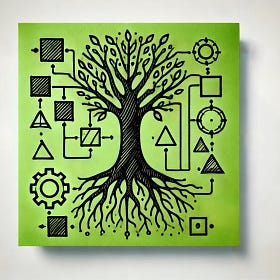The Incarnation is the foundation of all meaningful transformation—even your organizational one.
A short take.
The false starting point of change.
Strategy shifts, org chart reshuffles, new efficiency targets—we call that transformation.
I was talking with the VP of Transformation at a multibillion-dollar global organization. She told me that she had hired several transformation czars, one for each major area of the business. When I asked about them, I discovered they all came from process optimization roles at other large global firms.
Our “transformations” are often nothing more than optimizations and reconfigurations in the name of efficiency. We’re confused about transformation.
Deep down, many of us know: something’s off. The churn of change never really leads to the kind of renewal our firms, our business functions, our souls are aching for.
Real change doesn’t start with an efficiency problem.
It starts with a Person.
And not just any person—the Person who is The Word Made Flesh. He didn’t remain God apart from us—He became God with us… and nothing has been the same since.
The Incarnation is not a theological flourish. It’s not a metaphor. It’s not an abstract doctrine that means nothing to business. It’s reality. It’s history’s most radical intervention. It’s God putting on flesh, moving into the neighborhood, entering our existence, assuming our broken condition—and in doing so, healing it from within—remaking the very fabric of existence. All existence. That includes our organizational existence.
It’s judgment and hope in one blow.
When God reveals Himself in Christ, we not only see who God is, we see who we are in light of Him. In Jesus, God reveals just how far we’ve fallen, just how ridiculous our self-sufficiency is; the depth of our brokenness is exposed—that’s judgment. And at the same time, He reveals the extent of His love: that He came the distance anyway—that’s hope; He doesn’t abandon us in our ridiculousness—He finds us in it.
The disruptive implications of all of this—of the Incarnation—are unimaginable. God’s self-giving presence in Christ isn’t just a personal, private thing; it’s structural, cultural, and cosmic. He enters our world of self-preservation, market dominance, and strategic control—and undoes it.
He didn’t send a strategy. He sent Himself. And in doing so, He overturns the very logic by which all our institutions operate. Every system is called into question—every system built on autonomy, control, efficiency, market logic, scalability, human desire, progress. All our foundations and frameworks are undone: how we build, how we change, how we design, how we innovate, how we organize, how we define success.
The Word becoming flesh is not a nice add-on to whatever our (Sunday morning) worldview might be. It’s not a religious encouragement stapled onto the frontend of secular progress. It’s a takedown of all worldviews, including our organizational ones. In Christ, God didn’t come to boost our efforts—He came to end the delusion we have about them.
If Christ has come, died, risen, and ascended, then the deepest and most meaningful of all transformations has happened: He’s reconciled the world to Himself. Christ has inaugurated the new creation. The renewal of all things is already in motion. That includes every corner of life—even our organizational corner. All change is now derivative—it flows from that transformation.
So when we talk about transformation (personal, institutional, systemic), we’re not starting something new. It’s not waiting on our strategic planning. We’re joining what God has already begun. We’re responding to what is already true in Christ. It's underway. We now get to participate in it.
We’re catching up to it.
Our work—in leadership, transformation, design, innovation—is always second-order. It’s always responsive. The question isn’t, “How do we create something new?” The question is, “What does faithfulness look like in light of the renewal Christ has already begun?”
That’s why the Incarnation is the foundation.
The Incarnation is not merely a theological claim. It is a reality to live inside of.
Its consideration isn’t a tweak to our change model. It’s the demolition and re-creation of the world—including our business world.
It is the very fabric of all transformation. All faithful transformation—personal, organizational, cultural—begins here: God with us. God among us. God remaking the world… from within it.
Any meaningful transformation starts here. Any other start is a false start.
Any concept of change that begins with us—that begins with our business goals, our cultural analyses, even our spiritual aspirations for the organization—is already too small.
Real change begins with the self-giving of God in Jesus Christ. Full stop.
Is your version of change cruciform? Or is it just another attempt to ascend the tower of Babel with new branding?
“The Word became flesh and made his dwelling among us. We have seen his glory, the glory of the one and only Son, who came from the Father, full of grace and truth.”—John 1:14. This is the center of the claim. The Word didn’t just arrive. He dwelt. He disclosed glory. He didn’t remain distant—He entered and transformed creation from within it.
“He who was seated on the throne said, ‘I am making everything new!’ Then he said, ‘Write this down, for these words are trustworthy and true.’”—Revelation 21:5. This verse shows the arc from Incarnation to new creation. It reminds us that the transformation underway is not abstract—it’s personal, practical, and promised.
“To them God has chosen to make known… this mystery, which is Christ in you, the hope of glory.”—Colossians 1:27. This grounds it. The Incarnation is not just past—it’s present. It’s Christ in you. That’s the starting point for any faithful change. That’s the hope.
Go ahead. Dive deeper.



